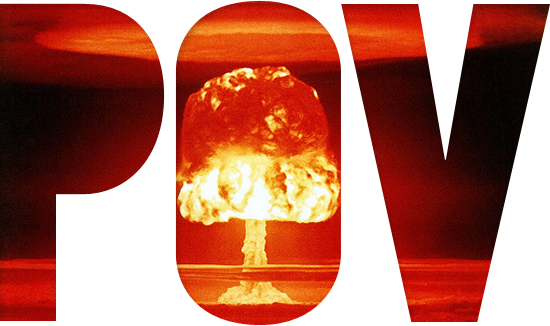POV: Nuclear Armament Is a Lose/Lose
Even unused, nuclear weapons damage the lives of millions

Photo courtesy of flickr contributor The Official CTBTO Photostream
“POV,” a new addition to BU Today, is an opinion page that provides timely commentaries from students, faculty, and staff on a variety of issues: on-campus, local, state, national, or international. Anyone interested in submitting a piece, which should be about 700 words long, should contact Rich Barlow at barlowr@bu.edu.
Amartya Sen is a Nobel Prize–winning economist and philosopher who is best known for his writings on famine and human development. His approach to the broader questions of foreign policy—including his commitment to nuclear disarmament—have not received as much attention, but they should.
In his essay “India and the Bomb,” Sen notes that military spending does not occur in a vacuum. A nation cannot increase spending on its armed forces and expect no response. Instead, one nation’s decision to increase its military spending will affect its neighbors. “Why,” these other heads of state might wonder, “is my neighbor developing or purchasing incredibly lethal arms? What is my neighbor planning to do with these new capabilities?” And if these persons are sufficiently alarmed, they might direct more resources to their own armed forces. The development or purchase of weapons in one country can have a cascading effect.
The key insight of Sen’s foreign policy lies here. In Sen’s words, one must take “into account the responses from others that would be generated by one’s pursuit of military strength.” Escalating actions almost inevitably lead to escalating “counteractions,” he says. This is not just an abstract and theoretical claim. Sen describes how the conflict between India and Pakistan morphed into a potential nuclear catastrophe through each nation’s commitment to a nuclear weapons program. Sen also discusses the Cuban missile crisis of 1962, when the Soviet Union and the United States came very close to ending human life.
There is nothing theoretical about these events. But the problem is not limited to the destructive potential of arms races in general—or nuclear weapons proliferation in particular. Sen also notes that a government must divert a large amount of society’s resources away from other vitally important social goals to construct “the bomb.” He writes:
Recently, C. Rammanohar Reddy, a distinguished commentator, has estimated that the cost of nuclearization is something around half of one per cent of the gross domestic product per year. This might not sound like much, but it is large enough if we consider the alternative uses of these resources. For example, it has been estimated that the additional costs of providing elementary education for every child with neighborhood schools at every location in the country would cost roughly the same amount of money. The proportion of illiteracy in the Indian population is still about 40 percent, and it is about 55 percent in Pakistan.
Public education for every Indian child could be achieved if the amount of money spent on India’s nuclear weapons program was spent on developing a system of neighborhood schools. And it is important to recall, in this context, Sen’s comments about the importance of literacy in general, and female literacy in particular. By expending resources on a nuclear weapons program that makes Indians less secure, literacy levels in India are lower than they could be; Indian society is deeply divided between the children who receive a formal education and the children who do not; there is more childhood mortality; and the population of the country is continuing to grow at an unsustainable level. This is a gigantic loss to accept in exchange for no gain. Nor is Sen’s criticism here aimed at India alone. The mistake that is harming the civilians of India is also harming the civilians of Pakistan. The foreign policy of these nations is capturing the domestic policy of these nations—to terrible effect.
Sen develops this analysis in the context of South Asia, but this framework can be applied more generally. How much money has the United States spent on its nuclear weapons program since its inception? Or Russia? Or the other nuclear powers of the world? Or the states that might be seeking, but do not yet possess, nuclear weapons? And what opportunities have been lost because of these commitments? The answer to these questions is clearly: way too much. A program of nuclear disarmament—coupled with the redirection of this spending to global development goals, such as mandatory, universal primary schooling—clearly has a lot going for it. A less militaristic foreign policy can accomplish much.
Neal Leavitt, a College of General Studies humanities lecturer, is the author most recently of The Foreign Policy of John Rawls and Amartya Sen (Lexington Books, 2013), from which portions of this article are excerpted. He can be reached at leavittn@bu.edu.
“POV” is an opinion page that provides timely commentaries from students, faculty, and staff on a variety of issues: on-campus, local, state, national, or international. Anyone interested in submitting a piece, which should be about 700 words long, should contact Rich Barlow at barlowr@bu.edu. BU Today reserves the right to reject or edit submissions. The views expressed are solely those of the author and are not intended to represent the views of Boston University.
Comments & Discussion
Boston University moderates comments to facilitate an informed, substantive, civil conversation. Abusive, profane, self-promotional, misleading, incoherent or off-topic comments will be rejected. Moderators are staffed during regular business hours (EST) and can only accept comments written in English. Statistics or facts must include a citation or a link to the citation.